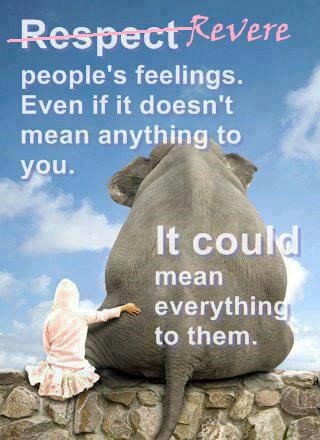Krishna Patel
Freelance Market Access Strategic Content Developer
Garbage In, Garbage Out
Garbage In, Garbage Out
When thoughtfully polished directions landed in the hands of a stressed out colleague, his stress rubbed off on the project, bringing everyone else down with him. With the deadline approaching and the project riddled with mistakes, the team was in utter chaos and busy shifting blame to protect their own jobs. Millions were lost in revenue from dropping the ball on this project.
Remember that first fallen domino? Had anyone cared to ask that colleague why he was stressed? What signal did he send out that suggested something might be wrong? This was an all-star professional. Recently, however, he was busy taking his dying aunt to appointments for chemotherapy.
Somehow, we’ve come to believe that we work with robots. The reality is far from that.
I used to have a poster at my desk which looked something like this:

What a wonderful reminder! The only thing I would change about this poster is elevate “Respect” to “REVERE.”
I don’t believe this is a cop-out. I believe it’s the truth. All humans deserve reverence (ESPECIALLY if they’re not all-star professionals). We thrive when we heed the truth, but break when we don’t.
The first domino wasn’t the stressed-out colleague. The first domino was lack of sensitivity to the sonder of another human being. If someone had sensed trouble, they would’ve done something differently.
Everyday I make a point to flex my empathy muscle to make it stronger. Work offers so many opportunities to practice, I just need to remember to do it–hence the poster as a reminder.
Student of Life
Student of Life
19 years (!) of school succeeded in making me want to hide, even though knowledge is supposed to have quite the opposite effect.
Since about 2 months ago, I’ve felt an unquenchable thirst for knowledge. Now I’m EAGER to learn more. Curiosity opens up a universe of possibilities. All day long I’m connecting dots. There is so much to learn!
Stanley Kubrick, a renowned American film director, said “Observation is a dying art.”
Socrates, the father of Western philosophy said, “The only thing I know is that I know nothing.”
Satya Nadella, CEO of Microsoft, says that leaders must shift from a “know it all” to “learn it all” mindset.
The Vedic scriptures say, “Om aa no bhadraah”: let noble thoughts come to me from all directions.
Doctors and lawyers are highly educated professionals, but still use the0 word “practice” for their professions, indicating they always have something to learn or sharpen.
A Place for Everything, Everything in Its Place
A Place for Everything, Everything in Its Place
If it can’t be found when I need it, it might as well not exist.
This applies to files, meeting notes, emails, and everything else.
I’ve been told by my colleagues that I should’ve been a lawyer because I can unearth a previous conversation along with the time stamp within seconds (even if it happened years ago). I actually have terrible memory, so it must be my organization skills.
This is how I organize my project work. Within any given project folder, I have 5 sub-folders. That’s it.
>>Archive
>>Background Materials
>>Client Feedback
>>Meeting Notes
>>References
Aside from the active file for the project, everything else lives in one of these 5 sub-folders.
After setting up the organization system, DISCIPLINE is required to maintain it. Just like cars, a healthy body, and relationships: if I demand it to work for me, it demands me to work for it, too.
What I Want Is Not What They Want. What They Want Is Not What I Want
What I Want Is Not What They Want. What They Want Is Not What I Want
When putting our creative work through medical/legal review, it can quickly feel like the reviewers are on a mission to get at market access professionals.
The reality is, both entities are hands of the same body. When market access professionals approach reviewers with harmony, we can clap together.
The only way to engage with someone is to begin where they are, to see what they see, to gain enrollment in a conversation that leads to forward motion. It’s only by seeking sonder we can start the process of enrollment. And that’s almost never done with a spreadsheet.
What would the review session look like if we went in with such an outlook? How much better would our creative work be in the end?
Killer Online Data Visualization Resources
Killer Online Data Visualization Resources
Stuck on how to represent something? Check out these amazing resources. Grateful for the generation contribution of Duarte, ferdio, and Data to Viz!
A Time for Everything
A Time for Everything
Was there ever a time when we thought about the million other deadlines while we were working on the project at-hand? (all the time!)
Amplify that noise with other the non-work priorities: go for a run, write the blog, make a grocery run, fold laundry, ….
Each second I give attention to these other priorities, I’m taking away a second from the project at-hand. It adds up.
There’s a famous quote by Jim Rohn: “Either you run the day, or the day runs you.”
Each item is special and worthy of REVERENCE. It helps to transfer it from the brain onto paper (make a list), and (if it makes sense) put it on the calendar. Once it’s on the calendar, there’s no getting around it now!
The reality is that there is one of me and infinite of them, so each item has to wait its turn so it gets the attention it deserves.
The Same Information Told Differently
The Same Information Told Differently
True story: a brilliant executive was trying to penetrate a new market, but could not get the customers to buy into his idea. The proposal written for this new customer segment was similar to the ones he would write for his current customer segment. Why didn’t it work? Rather than giving up, he asked his colleague (another brilliant executive) to write the same proposal differently. It worked! The customers bought his services.
Right content matched to the right people moves them.
Who am I trying to persuade?
In order for them to take action, who do THEY need to persuade?
What do I need to provide them so that they’re well-prepared to persuade their colleagues and not putting their reputations on the line (because who would take such risk at work)?
Good writers : customers :: chameleons : environment. Adaption.
The Buck Stops Here
The Buck Stops Here
President Harry S. Truman famously kept a desk sign that read, ‘The buck stops here!’
Rather than passing the ‘buck’ (responsibility/blame) to someone else, he took on the responsibility for the way the country was governed.
What a professional.
A consultant has the same responsibility to Clients (manufacturers), who have the responsibility to their customers (payers and providers), who have the same responsibility to patients. It’s hard to be mindful of this bigger picture when we’re busy in the day-to-day churn—but imagine what would happen if a single stakeholder in the chain passed on the buck to someone else instead of taking on the responsibility. That stressed out single mother who is barely getting by and working double shifts to put food on the table is counting on me to make sure she receives the proper rheumatoid arthritis treatment.
We expect electricity to relentlessly charge our homes (no excuses). We expect Covid vaccines to work (no excuses allowed there, either). Patients expect to get the treatment they need so they can move on with their lives (no excuses).
Market access is in the business of service.
Learning Is Like Stretching
Learning Is Like Stretching
We don’t stretch to burn calories. However, in order to do the work that burns calories, stretching has to happen first. Who knows the value of stretching better than those who rushed onto the treadmill without stretching, only to end up injuring themselves and unable to get back on the treadmill for a month? Besides suffering pain, they were unable to do exactly the thing that they so eagerly rushed into doing.
Taking out time for learning is the same. Learning itself doesn’t bring in revenue. However, I need to learn in order to do the work that brings in revenue.
How much time should I set aside to learn? The highest performers are learning 17 hours/day.
